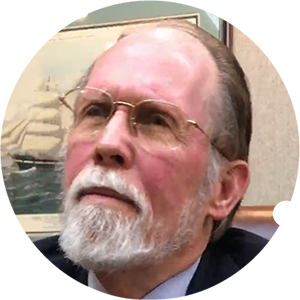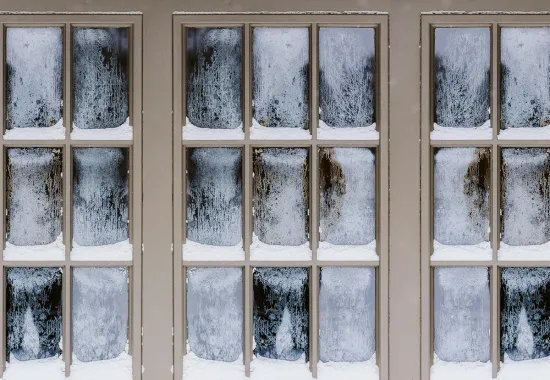That Kind of Blue
When he was five, it was only a marble he’d found but a pure crystal blue, and he held it up to the sun and got lost for a minute in the color. The other children were playing near the swings and he was alone. He heard them laughing, shouting, but the marble glowed in his fingers, as if alive, a source of power ready to surge color in waves across the yard. He saw it gathering in blue pools, swelling, to finally cascade in rippled sheets down the hill. The town would be lost beneath fathoms of blue. There would be panic and deaths. Bloated bodies would float slowly through the streets and gradually spiral up to where the sky once was. It was that kind of blue.
Now, Jaime kept the marble in his pocket and played with it in secret when he was upset, his fingers moving out of sight, when he felt the growing unease come upon him. It was Katherine’s presence, he knew, as if unwatched filaments had somehow formed between them, stretching as they separated. During the day he seemed to sense where she was, had delicious images of her walking queenly through the school hallways, or in a morning bedroom brushing her shoulder-length hair, or standing by the dinner table, fingers barely touching the gleaming wood. At those moments, an ecstasy fell upon him, as if he were at the limber top of tall trees swaying wildly in the wind. He didn’t yet know what to call this feeling, how to place it in his mind. It was merely a sensation, wonderful and terrifying, filled with loss and unbearable gain.
“Death isn’t so bad,” she said finally.
But it made him restless, and Jaime wandered through his house as if searching for something he’d forgotten. In the attic, he sat beneath a slanting ceiling in the musty air staring out a dormer window at the town falling away below him, the gray shingled roofs on the white clapboard houses, the ocean glinting at the hill’s foot, the sun setting in a turbulence of clouds.
When it was dark, he rolled his bike out of the garage and down the driveway, then leaped on the seat and pedaled furiously, the wind a cold force against his face, his legs burning, the frame of the bicycle shaking and bouncing against the asphalt. For a moment his actions fit his mood, as if he would ride off lifting into the darkened sky, then the road turned and fell down the hillside, and he was holding tightly onto the plastic hand grips, leaning back, braking the rear tire into skids.
Katherine lived where the asphalt faded into sandy grass and white tire ruts ran between maples and elms and disappeared around the belly of the hill, heading down to the water. The house was small, pinched onto a tiny lot bordered in the front with a paling fence fallen into disrepair. A single elm stood in a yard of bare-packed earth. On the ground floor, a large window glowed on the left of the porch, as did a smaller window on the right, framed by deep green external shutters. Above those were another series of smaller windows and then the steeply slanting roof. The lights were on in several of the rooms upstairs, and Jaime stood with the bicycle braced between his legs. She was in there, somewhere, he thought. She had two brothers and a sister, and he couldn’t imagine what it must be like, living in the same house, watching her move from one place to another, talking to her, as if it were nothing. How weird, how lucky, that would be.
The breeze was chill. The nearest streetlight was at the intersection, and it was dark where Jaime stood. Still, he felt restless and exposed and, after a few minutes of staring at the lights, hoping for a glimpse of Katherine walking by, he moved his bike to the side and laid it down in the grass of the empty lot, then crawled, a commando, part of the night, past the fence around to the back.
A shed with a corrugated plastic roof stood near the corner of the property, and a small distance from that sat an incinerator, a squat brick oven with a heavy metal door and a pipe chimney sticking up seven or eight feet. This is what she saw, he thought. This is what she was used to.
He hid behind the shed, stepping among the empty cans of paint and old two-by-fours and a rotted garden hose that he mistook briefly for a snake. One of the back upstairs lights was on, and he imagined it her bedroom. The shade was drawn, and he wished she would raise it and stick her head out to catch a breath of air. He’d seen it done in the movies. There was no reason it couldn’t happen, but he waited and waited and nothing moved, nothing changed. She was in there, but she wasn’t showing.
He continued around to the side, in the narrow space between the houses, and saw an older woman who must have been Katherine’s mother standing near a window, looking down, then moving back a strand of hair with her forearm.
He felt frustrated, nearly angry. This was so much closer and yet no different at all, not nearly what he wanted. Jaime suddenly felt stupid, an intruder, pushing his way into people’s lives. He imagined himself discovered. How could he explain what he was doing? What would Katherine think?
All the words were trapped, moving and pressing up against the flesh where her lips should be. He could see her struggle to respond and wanted to help her.
He bolted from the yard into the street, then raced to the empty lot and grabbed his bicycle and ran it for a few feet, then jumped on and pumped, thinking they were almost upon him, almost.
The next morning, a cold wind rose from the sea, filled with the damp smell of salt and vast distance. Jaime stood on the corner wrapped in a yellow jacket. His backpack, filled with schoolbooks and his lunch in a brown paper bag, was slung over his left shoulder and he waited in a trance of expectation. The bus squealed its brakes at the corner and turned its monstrous face slowly and slowly, then started to gain speed again, only finally to stop beside him. He climbed on, ignoring the driver and edged down the narrow aisle until he saw her, sitting near the middle. He walked past, feeling the pull, trying to look at her broad face–the clear eyes beneath dark brows, the brown hair falling past her shoulder–without staring. Two rows behind her and on the opposite side there was an empty seat, and he slid into it thankfully, able now to watch without being watched.
The bus leaped and bounced along the two-lane road, hugging the coast. Katherine was talking to the girl beside her, and Jaime could only see the back of her head, her stiff white blouse, but that seemed enough. When they started around Miller’s Cove, he looked out the window. The road wound higher up the bluff and the gray sea dropped away. Three gulls flew for a moment by them, slanting down, and Jaime followed them with his eyes. Falling, falling through the long column of air, let loose at last. He could almost feel their exultation.
That night, he sat in the attic and stared out the dormer window and held the marble in the palm of his hand. Below the town, the tide was at flood, the full belly of water swelling between the arms of land, and Jaime saw himself, as if on TV, standing on the shore at the very point, feeling its weight, the power of its thwarted intent. The air filled with the flight of birds and he wasn’t alone, not alone at all. Katherine waited beside him, holding his hand in her perfect hand. She was wearing a green dress and looking at him, but he couldn’t see her face. It came into focus, then drifted away, a pale flat circle of flesh, until suddenly the eyes appeared, large and clear and so serious, so very much adoring, as if he fell the length of her soul, entering her completely.
“I’m glad you’re here,” he said.
But she was silent. All the words were trapped, moving and pressing up against the flesh where her lips should be. He could see her struggle to respond and wanted to help her. His hands grabbed her shoulders, brought her closer, her lips forming, perfect and almost pressed to his, then his father called his name again.
“What the hell are you doing?” he said, shouting up the stairs.
Jaime clutched the marble and stood, putting it back in his pocket, rolling it between his fingers.
⬤
It was late afternoon toward the end of the term, and about time, just before the last class of the day. He imagined himself a pure flame, fire licking the fluorescent lights in thin beams overhead, and he walked the narrow stretch to where Katherine was standing in a yellow shirt and brown skirt. The bell was about to ring and the hall was loud, filled with screams.
“Hi,” he said.
She stood with her friend Chrissy and looked at him with a puzzled expression, waiting.
He, too, waited, and the seconds dragged out, slogged their dimwitted way across the tiles until it grew painful. She seemed amused now and he wanted to run. His fingers rolled the marble in his pocket, uncontrolled, nearly spastic.
“What do you want?” she said at last.
He had no idea, no idea at all. To stand there beside her, to listen to her voice, to look at her eyes, hazel and filled with so many different colors, like fire licking up. He could feel heat rising, as if something were on the verge of happening.
“Why are you bothering me?” she asked. “Why don’t you go away?”
He stared for a minute until the words made sense, then turned and ran, pushed his way through the mass of students walking forward, a stream breasting against him, but not quickly enough to avoid hearing their amazed, delighted laughter. Then he was outside and the long, low beige building was behind him and he hated the school and everyone in it. They’d be talking together. That’s what they would be doing, all of them ganged up against him. He jumped on his bike and rode home and ran up to the attic and moved through the boxes and empty luggage and old Christmas ornaments, kicking and hitting whatever he found. Clouds of dust rose and thickened the air around him as he spun.\
Now and then, she talked to him in a soft, raspy voice, asked him how his day was, what he was doing. Nonsense questions he couldn’t answer. How was his day? What was he doing?
“Jaime!” his father shouted up the stairs. “Get on down here!”
He left his backpack and stepped down the stairs. His father was waiting for him in the hallway. “What are you doing up there?”
It was his place, all his own, but there was no way he could say that, no way that his father would understand. He put his hand in his pocket and moved the marble back and forth. “I was looking for something,” he said finally.
His father’s face, chubby and old, twisted into an expression Jaime was familiar with, a combination of what-the-hell-is-wrong-with-this-boy and a pained self-pity. “Did you find it?”
Jaime shook his head and wandered into the living room. His mother was sitting on the couch with a blanket over her legs and her novel on the end table beside her.
“My goodness,” she said, smiling up at him. “You just raced right on by me and didn’t even say ‘Hi’.” She held her cheek up for a kiss.
He kissed her. “Hi,” he said.
She smiled. “Are you going to help your father with supper? He really could use it. We’re having vegetables. He promised.”
Jaime’s mother had metastatic leukemia, and he couldn’t help but picture the small cells flaking off the tumor and drifting through her veins and arteries, eating her slowly here and there, bit by bit. He tried to stop thinking. “Sure, Mom.”
⬤
When his parents were asleep, he crept quietly back to the attic and sat again as he had so often in front of the dormer window, looking out at the stars in the night sky and the few lights below. He sat and thought for a while about his folks, alone in their bed below him, and the passage of time and the accumulation of trouble.
“You know I don’t like you,” Katherine might have said. “You’ve always known that, haven’t you?”
He watched as she laughed and spread herself out against the roof beams. He shook his head. His hand hurt where he had punched some boxes and he held it, the marble cradled inside his fist.
She smiled, but she was naked and it took a moment for him to notice.
“It’s all your fault,” she said and moved in twitches.
She was so beautiful and he wondered what she meant.
“You can do something about it,” she said and moved closer, her hair darker than normal and falling like a curtain about him. “Would you like me to kiss you?” she whispered.
He shook his head. No way. This wasn’t her; she would never say such a thing. He looked up at her. She didn’t care for him. Then he thought for a while, but still she laughed and only eventually faded back into the shadowed spaces between the beams.
After a while, staring out the dormer window, he felt better. He stared at the night sky. At first, there were only the stars. Nothing occurred to him. Then, Katherine was at home with her head finally out her bedroom window, her elbows on the sill and her cheeks in the palms of her hands, dreaming and distant, catching some of the blue night air.
⬤
School ended for the summer and his mother’s condition worsened. She was gone for two weeks in the hospital, then came home for hospice. A bed with railings and levers was delivered and placed next to the window in what had been the guest bedroom. The county nurse handed over her visitation schedule, mornings and afternoons, eight and four, and explained to Jaime and his father what hospice was, what care for the patient was required, what cleaning and wiping would be necessary, what drugs would be administered, and who to call until the end and who to call after that.
Jaime was stunned and sat by her bed for hours in a folding chair until he couldn’t anymore. His mother mostly slept, came groggily awake to use the bathroom, as he half-carried her there and saw what he never should have seen. He hardly registered the change in his life, the way her skin had gone all papery, the weight she’d lost leaving her ribs all bony, the private hair, the way her jaw hung open nearly on her throat as she slept, what he had to do when no one else was around. It was as if it were all happening to someone else. He tried to imagine who that someone else could be, wanted to see him floating stretched on the ceiling, but nothing happened.
Now and then, she talked to him in a soft, raspy voice, asked him how his day was, what he was doing. Nonsense questions he couldn’t answer. How was his day? What was he doing? Once, she grabbed his wrist, her fingers insistent. “Show me,” she said. He opened his hand and the marble was there, glowing faintly in the sunlight.
His mother died, was cremated, and a bit of her for some reason was placed into a small, ceramic bluebird.
“Show me,” she said again.
He held the marble up to her eyes, where it came alive in coruscating blue. She smiled slightly and seemed lost in it. She held his hand where it was and stared.
“Death isn’t so bad,” she said finally.
Jaime shut his hand and pulled the marble away, and ran from the room, making small noises, not moans, not screams, but sounds he’d never heard before. He climbed the stairs to the attic and sat in a corner by large cardboard boxes. He wanted to cry, to hurl himself out of himself, but couldn’t. Nothing came, as if whatever it was were clogged, trapped in the plumbing, somehow. He waited in the silence of the attic, dust motes circling in the air, and then it started.
There was darkness, something dark approaching, forming in the shadows. His mother spread herself across the attic roof-beams, a sweet smile on her lips, but her limbs askew, and then she had a worried expression, and looked behind her as if she sensed something coming, but he didn’t want that, tried to change it, to shut it down. Katherine appeared, naked and smiling, with adoration eyes, but something dark moved on her left leg and her smile widened, grew hollow as her lips spread into a large oval, jaws hugely distended, and her body shook as bit by bit her right leg disappeared in a flashing of teeth.
His mother died, was cremated, and a bit of her for some reason was placed into a small, ceramic bluebird. It sat on a shelf in the living room next to a family picture, and Jaime never went into that room again, refusing when guests arrived, when his father was watching something on the television, when it was the shortest way to the front door.
“That’s my son,” his father often said in explanation. “He took his mother’s passing hard.”
But Jaime couldn’t understand how anyone could sit on the couch and look at his mother on the shelf, how that might even be possible, be endured. He tried not to hate his father, who obviously could.
When school started back up and the novelty of new rooms, new subjects, new classmates wore off, Jaime noticed the difference. At first, he thought it was simply being older and in another grade, but his friends seemed to keep their distance and Katherine nodded and smiled and said Hi each time he passed her in the halls. He no longer carried the marble, but had placed it in a small bowl on his bedroom dresser. Every once in a while, he noticed it softly glowing, but all that was in the past, was obviously meant for someone else entirely.
Recommended
The Monstera
The Wild Women of Brigantine
The Salamander






